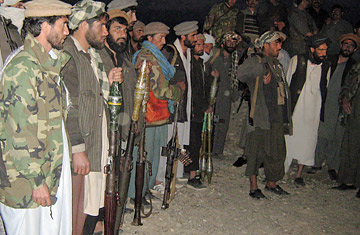
Hezb-i-Islami fighters, loyal to regional warlord Gulbuddin Hekmatyar, surrender their arms to Afghan police in Baghlan province, Afghanistan
The mujahedin insurgents who wrecked the Soviet occupation of Afghanistan in the 1980s went to war with one another after the Red Army had departed. But the Taliban and allied insurgents are skipping the formality of waiting for NATO to leave. A fierce battle last weekend in northern Afghanistan's Baghlan province between fighters of the Taliban and their erstwhile allies Hezb-i-Islami killed more than 50 combatants and 19 civilians — and may prove to be a major boon to Afghan President Hamid Karzai.
Until now, commanders of the Taliban and Hezb-i-Islami had carved up the territory's drug routes, set up road tolls and generally left each other alone in what was effectively a no-go area for NATO and Afghan troops. But that alliance was shattered by the firefight that erupted early Saturday. And when Hezb-i-Islami fighters realized that the Taliban had them surrounded and outgunned, they made a desperate call to the authorities, declaring that they were switching sides to join the government and asking for reinforcements to be sent — and fast.
It remains unclear what caused the violent split in a part of Afghanistan that is remote even by that country's standards of extreme desolation. A police official said it might have started when the Taliban raided a Hezb-i-Islami camp and tried to kidnap some of their men. Another version suggests that the two militias were caught on opposite sides of a tribal feud. Whatever its cause, the schism could have powerful political implications: Hezb-i-Islami's leader, Gulbuddin Hekmatyar, a ruthless mujahedin commander who fought the Soviets and later shelled Kabul in the early 1990s, killing thousands, is known to be Pakistan's man. Two weeks ago, Pakistani police arrested the Taliban's shadow governor in Baghlan who had slipped across the border. Taliban fighters may have suspected that Hekmatyar had something to do with their regional chief's capture.
The desperate defection of a hundred or so Hezb-i-Islami's fighters is a timely benefit to Karzai's government and to NATO forces, which had been losing ground to insurgents in the north. It also presents Karzai with a piece of the puzzle in any future reconciliation talks with the Taliban and its anti-U.S. allies, such as Hekmatyar and the Haqqani network, which launches forays and kamikaze attacks from its bases in the Pakistan mountains to as far west as Kabul. Hekmatyar, whose forces probably number several thousand and are scattered in the eastern and northern provinces, may be positioning himself for a seat at the bargaining table with Karzai and the Taliban. Many of his fighters are drawn from refugee camps in Pakistan, and Kabul officials say Hekmatyar receives support from both Pakistan and Iran.
Several weeks ago, Hekmatyar's son-in-law, who resides mostly in Islamabad, met secretly in the Maldives with a Karzai envoy, but Pakistani sources say the talks yielded nothing. In the past, Hekmatyar has said his men would lay down their weapons 18 months before a pullout of NATO troops, if a neutral government were installed in Kabul — neither of which is acceptable to Karzai or to NATO generals. Still, Hekmatyar is hedging his bets; a faction of Hezb-i-Islami has won seats in the Afghan parliament.
The Taliban have long been wary of Hekmatyar. When Taliban leader Mullah Omar's fighters swarmed into Kabul and its environs in November 1994, the warlord who had shelled the city was ordered to disband his militia and leave. He fled to Iran but returned after 9/11 to make common cause with the Taliban against foreign troops. Now officials in Kabul are hoping that the outbreak of fighting between Hekmatyar's militias and the Taliban in Baghlan may lead to an unraveling of their pact in other parts of Afghanistan.
— With reporting by Shah Mahmood Barakzai / Kabul
